Premium Only Content

La Villa Strangiato Rush
La Villa Strangiato by Rush
Villa Strangiato is a real place in Italy. It was the home of the late Barone (Baron) Strangiato, an Italian nobleman, but it is not a major Italian landmark. Neil Peart joked that Rush spent more time working on this song than they did on the entire Fly by Night album.
Hemispheres is the sixth studio album by Canadian rock band Rush, released in October 1978 by Anthem Records. After touring to support the band's previous release, A Farewell to Kings, during which the group gained popularity in the UK, Rush started work on their next album. As with the band's previous studio album, Hemispheres was recorded at Rockfield Studios in Monmouthshire and Trident Studios in London with longtime engineer and arranger, Terry Brown. Rush continued its progressive rock sound with the side-long "Cygnus X-1 Book II: Hemispheres" and the nine-minute instrumental "La Villa Strangiato", which was the band's first instrumental piece.
"La Villa Strangiato" is a nine-minute instrumental in 12 distinct sections and a subtitle of "An Exercise in Self-Indulgence". According to Lifeson, it is based on the various nightmares he would have, particularly while on tour, which provided the theme to what he described as a "musical re-creation" of them. The track was the sole piece that developed from the two-week rehearsal period the group had prior to entering the studio. Rush encountered great difficulty in recording it, as the band wanted it put down as a single live performance, rather than a more produced and edited piece. Lee said it took them around 40 takes to produce a take they were satisfied with. Peart and Lee pointed out that they spent more time recording "La Villa Strangiato" than they did recording the entire Fly by Night (1975) album. Peart recalled the group spent four days and nights playing it repeatedly, playing while their hands were sore and their minds tired. "We were determined to get the whole thing perfect, but in the end I just couldn't do it, and we ended up putting it together from a few different takes." The segments "Monsters!" and "Monsters! (Reprise)" are adapted from "Powerhouse", a 1937 jazz instrumental by Raymond Scott.
-
 6:01
6:01
Psychological operations
10 hours agoBattle Of Evermore Led Zeppelin
19 -
 34:44
34:44
LFA TV
5 days agoMIRACLES DO HAPPEN!
72.1K1 -
 LIVE
LIVE
GamersErr0r
4 hours ago $2.26 earnedMooning My Community
505 watching -
 2:22:59
2:22:59
Banks Atkin Live
7 hours agoChilling playing Games & Vibin
53.4K1 -
 8:08:50
8:08:50
Dragoon_B
8 hours agoNothing crazy - just Counter Strike + Valorant
20.1K1 -
 18:03
18:03
Stephen Gardner
8 hours ago🔥YES!! Trump GETS HUGE win in 4th district court!!
68.6K384 -
 4:40:54
4:40:54
G3T
6 hours ago🔴GET | not saying it
19.1K -
 15:35
15:35
DeVory Darkins
13 hours ago $4.64 earnedGavin Newsom drops CRUSHING BLOW on Democrats
23.7K68 -
 4:26:06
4:26:06
Etheraeon
9 hours agoPUBG: Battlegrounds | Total Bot Domination
17.7K -
 3:18:33
3:18:33
House of Jacobs
6 hours agoElden Drinks - Drunk Souls Series
15K1